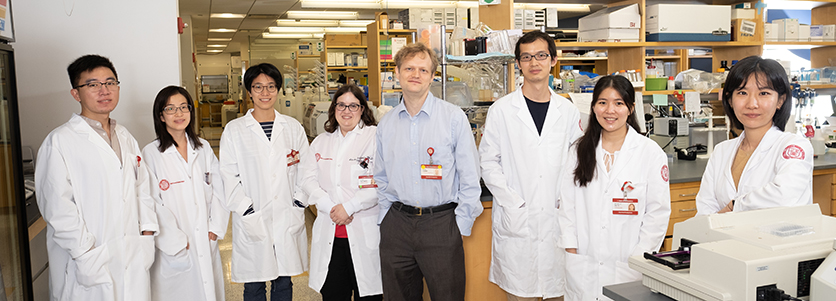Contact Information
Matthew B. Greenblatt, M.D., Ph.D.
Associate Professor of Pathology and Laboratory Medicine
Weill Cornell Medical College
Office: 212-746-1602
Lab: 212-746-1095
Approximately half of all women and a fifth of all men will experience a skeletal fracture due to osteoporosis or other diseases causing low bone mass. These fractures kill as many women each year as breast cancer, as fractures often lead to immobility that in turn leads a spiral of progressive deconditioning that can ultimately prove fatal. Improving clinical outcomes in this area will ultimately require finding new therapeutic agents that promote the generation or activity of osteoblasts, the cells that build bone. Ultimately, all bone-forming osteoblasts come from skeletal stem cells, an adult stem cell type that has only recently begun to be studied. A key focus of our work has been the idea that there is not a single skeletal stem cell, but many versions of these cells, each residing in different regions of the skeleton and having distinct contributions to both the normal formation of the skeleton and to the development of skeletal diseases. Our work in this area started with the identification of a new stem cell on the outer surface of bone (Debnath et al., Nature 2018) and is now continuing to identify new stem cells in other regions of the skeleton, including the spine and the skull.
We are also investigating the environmental factors and signals that both support these stem cells and drive their production of bone-forming osteoblasts. In our prior work, we have identified that osteoblasts secrete factors known as SLITs that promote the formation of special blood vessels that in turn tailor the environment in bone to favor new bone formation (Xu et al., Nature Medicine 2018). Accordingly, treatment with SLITs can promote new skeletal blood vessel formation and also reverse bone loss in mouse models of osteoporosis or promote healing in models of fracture repair. In other studies, we have identified a new therapeutic target for the treatment of neurofibromatosis type 1, a disorder whose manifestations include skeletal fragility and impaired fracture healing (Bok et al., Nature Communications 2020). Lastly, we have also identified a new receptor on osteoblasts that regulates responses to a family of proteins, termed the hedgehog family, that provide environmental signals controlling bone formation (Sun et al., Nature Communications 2021). Currently, we are both working to explore how these discoveries may be relevant for the treatment of skeletal disorders and also to identify new therapeutic approaches to increase bone mass and prevent fractures, both in osteoporosis and also in rare genetic diseases of bone.
Currently, an area of focus in the lab is understanding how alterations in the signaling of mitogen activated protein kinases contribute to the development of both osteoporosis and rare skeletal disorders, with a particular emphasis on discovering approaches to target these pathways for therapeutic benefit in humans.
PI: Matthew Greenblatt, M.D., Ph.D.
Novartis Institutes for BioMedical Research
PI: Matthew Greenblatt, M.D., Ph.D.
Weill Cornell Medical College
PI: Matthew Greenblatt, M.D., Ph.D.
National Institute of Arthritis & Musculoskeletal & Skin Diseases
PI Subaward: Matthew Greenblatt, M.D., Ph.D.
National Institute of Dental & Craniofacial Research
PI Subaward: Matthew Greenblatt, M.D., Ph.D.
National Cancer Institute
PI: Matthew Greenblatt, M.D., Ph.D.
The Pershing Square Sohn Cancer Research Alliance
Co-Investigator: Matthew Greenblatt, M.D., Ph.D.
National Institute of Child Health & Human Development
PI: Matthew Greenblatt, M.D., Ph.D.
Burroughs Wellcome Fund Career Award for Medical Scientists
PI: Matthew Greenblatt, MD PhD
United States Department of Defense (DOD)- Incoming Subaward
PI: Seoyeon Bok, PhD
Weill Cornell Medicine Dean’s Office (Jumpstart award)
PI: Ethel Cesarman, MD PhD
Co-PI: Matthew Greenblatt, MD PhD
National Institutes of Health (T32 grant)
PI: Matthew Greenblatt, MD PhD
Charles A. Frueauff Foundation
PI: Matthew Greenblatt, MD PhD
Cornell China Center
PI: Matthew Greenblatt, MD PhD
Pershing Square Foundation
PI: Shawon Debnath, PhD
National Institutes of Health (K99 grant)
PI: Shawon Debnath, PhD
United States Department of Defense
PI: Seoyeon Bok, PhD
Arthritis National Research Foundation
PI: Shawon Debnath, PhD
The American Society for Bone and Mineral Research
PI: Matthew Blake Greenblatt, MD, PhD
Mary Kay Foundation
PI: Matthew Blake Greenblatt, MD, PhD
SPROUT award (Cornell University, Ithaca, NY)
PI: Matthew Blake Greenblatt, MD, PhD
William Rhodes and Louise Tilzer-Rhodes Center for Glioblastoma
PI: Sun Jun, PhD
Children’s Tumor Foundation
PI: Alisha Yallowitz, PhD
Hospital For Special Surgery T32 (T32AR071302-01) from NIH-NIAMS
PI: Shawon Debnath, PhD
2023 Tri-Institutional Breakout Award
PI: Alisha Yallowitz, PhD
Primary Parents (RAPP) Award of the Mastercard Diversity-Mentorship Collaborative
PI: Matthew Blake Greenblatt, MD, PhD
SPORE in Prostate Cancer WCM

Matthew B. Greenblatt, M.D., Ph.D.
Associate Professor of Pathology and Laboratory Medicine
Weill Cornell Medical College
Office: 212-746-1602
Lab: 212-746-1095